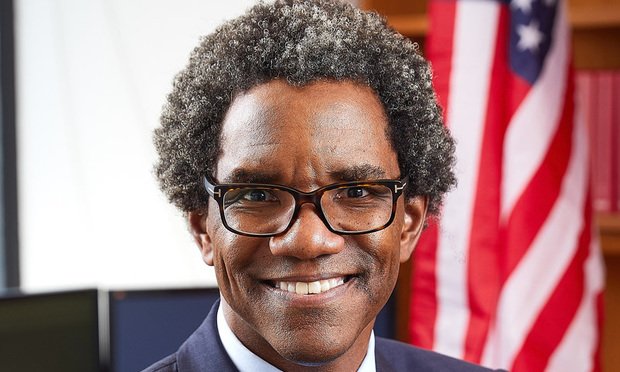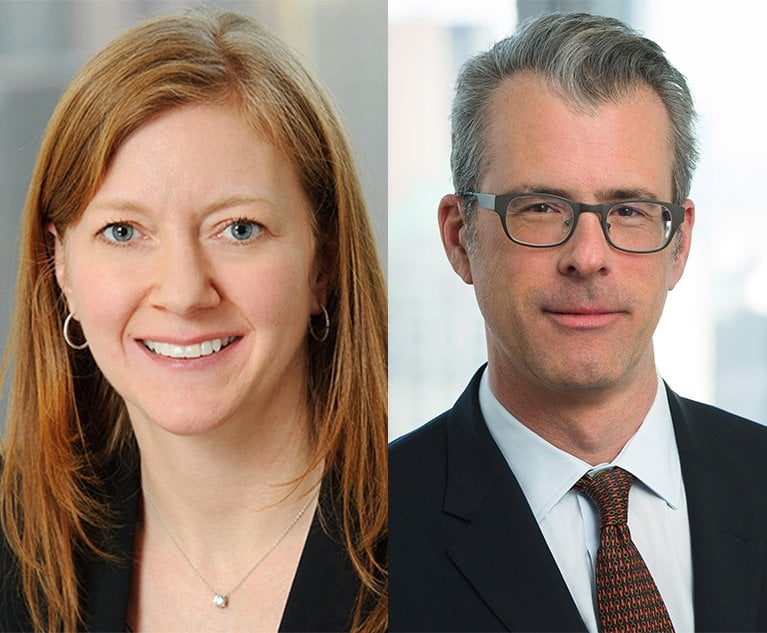NY AG Candidate Questionnaire: Keith Wofford, Republican, Partner at Ropes & Gray
"I welcome the prospect of working with the Legislature on legislation to augment the attorney general's ability to fight corruption. However, in my view, the OAG has tools to investigate now."
October 25, 2018 at 02:11 PM
10 minute read
 Keith Wofford, a partner at Ropes & Gray.
Keith Wofford, a partner at Ropes & Gray.
Voters in New York state are set to choose their next state attorney general in less than two weeks on Tuesday, Nov. 6.
The office, currently held by Attorney General Barbara Underwood, has tremendous power to litigate both state and federal issues involving many players, from a business owner in Buffalo to President Donald Trump.
Keith Wofford, a Republican and co-managing partner at Ropes & Gray in Manhattan, is seeking to become the next person to hold the office. He would be the first person of color elected to the position and the first private attorney to be elevated to the position since former Gov. Eliot Spitzer, who left the office in 2006.
Wofford is a Buffalo native who has worked in corporate law for much of his career in New York City, where he moved after graduating from Harvard Law School.
The New York Law Journal developed a series of questions relevant to our readers and voters statewide and sent identical versions to both Wofford and his Democratic opponent, New York City Public Advocate Letitia James.
James' answers to our Candidate Questionnaire may be read here.
Here are the answers we received from Wofford, edited only to conform to NYLJ and ALM style.
How would you organize and staff the office and secure proper resources and authority to reflect your priorities?
- Should the powers of the Attorney General's Office be expanded? Are there any areas where the tools afforded by the Legislature to the AG are too limited?
It is always helpful to have additional investigative authority, but as I have said repeatedly during this campaign, the attorney general has the authority to investigate corruption based on the State Constitution, the Parens Patriae doctrine, Executive Law 63(12), New York Public Officers Law 72s, the Martin Act, General Municipal Law 801 and 804, GBL 349, the Public Integrity Bureau of the OAG, and the Operation Integrity collaboration with the Comptroller's Office. I welcome the prospect of working with the Legislature on legislation to augment the attorney general's ability to fight corruption. However, in my view, the OAG has tools to investigate now.
- Are there any bureaus of the Attorney General's Office that you think are currently underutilized? Are there any particular divisions of the office or resources that you would like to reallocate or reduce? Are there areas of the state that you view as underserved where you would like to open or beef up regional offices?
Shortly after I am elected, I will meet with leaders of the office to learn about the current operational structure and staffing of each bureau, and assess the office's needs and ways to improve it. One area of immediate interest will be the Public Integrity Bureau, given the number of public state and local officials who have [pleaded] guilty or have been convicted of state or federal crimes over the past decade, and how the office can be a resource to small businesses as they seek to navigate the state's bureaucracy.
In addition, I will commit resources to create an office to assist small and medium-sized businesses in their dealings with the labyrinthine state bureaucracy. And I will make sure that the civil bureaus that affect creation of new real estate are adequately staffed and funded.
Overall, I will apply the principles that I used as co-managing partner of Ropes & Gray's New York office, which has over 700 lawyers and staff. I will identify smart, hardworking, motivated lawyers who have a track record of achievement, establish priorities for the office, and give them the room to perform. I will demand excellence and hold everyone to the standard that I hold myself.
What is the proper scope of the attorney general's power to punish and deter public officials' misconduct?
- Does the office need broader grants of authority to stamp out corrupt practices in Albany?
From day one as New York state attorney general, I will use every tool at my disposal to fight corruption and protect taxpayers. After being sworn into office, I will immediately initiate an investigation into systematic corruption involving state and local government officials across the state. Unlike what my opponent has said, the attorney general has the independent legal ability to investigate and prosecute corruption without the consent of the governor or Legislature. I will use all the powers granted to my office, including parens patriae, the Martin Act, as well as a number of other statutory authorities to pursue illegal and legal corruption wherever it occurs. I will use the full authority of the office to review potential problem contracts that harm taxpayers. It's time New York state had an independent attorney general, and I intend to fulfill my constitutional duty to protect the hardworking residents of this state.
- The Legislature approved a new commission to investigate prosecutorial misconduct by the state's district attorneys this year. Do you support such a commission and do you think the AG's office should also be subject to its review?
I agree with Attorney General Underwood that the proposed commission on prosecutorial misconduct is legally suspect on separation of powers grounds. Procedures already exist to discipline district attorneys who abuse their office. Currently, the governor can remove the district attorneys after an investigation, and if their conduct is found to be egregious, they can be subject to discipline by the Grievance Review Committee, or even disbarment.
I also recognize that overzealous prosecutors can, and in some instances do, ruin lives. But before we create new rules and commissions, we should clean up existing problems involving prosecutorial misconduct. One notable example is the Office of the Bronx DA, where there is an institutional practice of manipulating the speedy trial rules. A prosecutor can claim to be ready for trial, whether or not they are actually ready to move forward. The practice stops the “speedy trial” clock and can suspend or eliminate the defendant's speedy trial rights. I support prosecutors building solid cases so that wrongdoers face justice. But the brazen abuse of process occurring in the Bronx adversely impacts the accused. This is unfair and should be stopped.
What is the proper role of the attorney general in addressing gender power imbalances?
- What should be the attorney general's role in addressing sexual harassment in both the private and public sectors?
Allegation of sexual harassment should be taken seriously regardless [of] whether it occurs in the public or private sectors. I share the OAG's current approach to equality in the workplace where no one is subject to unwelcome comment or be required to grant sexual favors to advance. I will enforce federal, state, and local laws that give employees the right to be free from sexual harassment. And I will ensure that the OAG's Civil Rights Bureau continue to prioritize our fight against sexual harassment.
- How would you protect the rights of New Yorkers to equal pay?
Similarly, I support equal pay for equal work. My office will enforce existing laws to ensure that employees are not discriminated against based on gender, race, or other impermissible factors.
How does the national political environment affect the attorney general's priorities?
- How would you evaluate when it is appropriate to challenge a federal policy initiative?
My approach to litigating against the federal government will be based on whether (1) we have a sound legal position and (2) the litigation benefits the state of New York as an independent sovereign, and its citizens and residents. Unlike career politicians who are more interested in generating headlines than in getting results, I will focus the office's efforts on getting the best results for the people of New York.
- Do you approve of the state attorney general's active role in litigating against policies of the Trump administration?
If the state of New York or its taxpayers have a good-faith dispute over the actions of the federal government, the OAG should do its diligence and bring litigation, where merited by the facts and the law. Generally, it is a misuse of resources, however, to commence or join litigation that are primarily political in nature. We will review the pending litigations against the federal government when I am elected, and if they are legally meritorious and beneficial to the state, its taxpayers and its citizens, we will pursue them.
Can you share with Law Journal readers something they don't know about you that reflects your life and career as a lawyer?
- Who would you look to as a role model for public service, especially in a legal or law enforcement capacity?
Politicians are usually not role models for me. But Abraham Lincoln, our greatest president, is an exception. He saved the union and freed the slaves. And the Emancipation Proclamation and the post-Civil War constitutional amendments that followed his presidency are at the core of our constitutional republic.
- What lawyers have been the most important mentors in your career?
My most important legal mentors have been those, throughout my career, who have given me a chance to succeed—or to fail. The lawyers in Buffalo for whom I worked (the late Richard Moot, James Magavern, Judge Matthew Jasen, who sat on the N.Y. Court of Appeals, among others) were all great mentors. And the partners at Wachtell Lipton (my first job out of law school) taught me the commitment and skill that great lawyering requires.
- Can you point to a case you have worked on as a lawyer that has shaped your outlook on the legal profession and the rule of law?
My view of the law has been shaped by all of my cases, rather than by a single one. My career has been filled with tough cases—in part, because no one hires top law firms for the easy cases. And what I learned from those cases is that the identity and quality of the lawyers can make a huge difference in the result for the client. That is why I want the state and its citizens to have the best lawyer as AG—because the right lawyer in that seat can make all the difference to the state and its citizens between winning and losing.
READ MORE:
AG Candidate Questionnaire: Letitia James, Democrat and New York City Public Advocate
This Ropes & Gray Leader Is Running for NY Attorney General. Why?
New Yorkers' Choice for AG Boils Down to Litigation-Minded Public Advocate or Big-Law Partner
This content has been archived. It is available through our partners, LexisNexis® and Bloomberg Law.
To view this content, please continue to their sites.
Not a Lexis Subscriber?
Subscribe Now
Not a Bloomberg Law Subscriber?
Subscribe Now
NOT FOR REPRINT
© 2025 ALM Global, LLC, All Rights Reserved. Request academic re-use from www.copyright.com. All other uses, submit a request to [email protected]. For more information visit Asset & Logo Licensing.
You Might Like
View All
FTC's Shaoul Sussman Discusses Draft Merger Guidelines With Skadden
18 minute read
Trending Stories
- 1'A Death Sentence for TikTok'?: Litigators and Experts Weigh Impact of Potential Ban on Creators and Data Privacy
- 2Bribery Case Against Former Lt. Gov. Brian Benjamin Is Dropped
- 3‘Extremely Disturbing’: AI Firms Face Class Action by ‘Taskers’ Exposed to Traumatic Content
- 4State Appeals Court Revives BraunHagey Lawsuit Alleging $4.2M Unlawful Wire to China
- 5Invoking Trump, AG Bonta Reminds Lawyers of Duties to Noncitizens in Plea Dealing
Who Got The Work
J. Brugh Lower of Gibbons has entered an appearance for industrial equipment supplier Devco Corporation in a pending trademark infringement lawsuit. The suit, accusing the defendant of selling knock-off Graco products, was filed Dec. 18 in New Jersey District Court by Rivkin Radler on behalf of Graco Inc. and Graco Minnesota. The case, assigned to U.S. District Judge Zahid N. Quraishi, is 3:24-cv-11294, Graco Inc. et al v. Devco Corporation.
Who Got The Work
Rebecca Maller-Stein and Kent A. Yalowitz of Arnold & Porter Kaye Scholer have entered their appearances for Hanaco Venture Capital and its executives, Lior Prosor and David Frankel, in a pending securities lawsuit. The action, filed on Dec. 24 in New York Southern District Court by Zell, Aron & Co. on behalf of Goldeneye Advisors, accuses the defendants of negligently and fraudulently managing the plaintiff's $1 million investment. The case, assigned to U.S. District Judge Vernon S. Broderick, is 1:24-cv-09918, Goldeneye Advisors, LLC v. Hanaco Venture Capital, Ltd. et al.
Who Got The Work
Attorneys from A&O Shearman has stepped in as defense counsel for Toronto-Dominion Bank and other defendants in a pending securities class action. The suit, filed Dec. 11 in New York Southern District Court by Bleichmar Fonti & Auld, accuses the defendants of concealing the bank's 'pervasive' deficiencies in regards to its compliance with the Bank Secrecy Act and the quality of its anti-money laundering controls. The case, assigned to U.S. District Judge Arun Subramanian, is 1:24-cv-09445, Gonzalez v. The Toronto-Dominion Bank et al.
Who Got The Work
Crown Castle International, a Pennsylvania company providing shared communications infrastructure, has turned to Luke D. Wolf of Gordon Rees Scully Mansukhani to fend off a pending breach-of-contract lawsuit. The court action, filed Nov. 25 in Michigan Eastern District Court by Hooper Hathaway PC on behalf of The Town Residences LLC, accuses Crown Castle of failing to transfer approximately $30,000 in utility payments from T-Mobile in breach of a roof-top lease and assignment agreement. The case, assigned to U.S. District Judge Susan K. Declercq, is 2:24-cv-13131, The Town Residences LLC v. T-Mobile US, Inc. et al.
Who Got The Work
Wilfred P. Coronato and Daniel M. Schwartz of McCarter & English have stepped in as defense counsel to Electrolux Home Products Inc. in a pending product liability lawsuit. The court action, filed Nov. 26 in New York Eastern District Court by Poulos Lopiccolo PC and Nagel Rice LLP on behalf of David Stern, alleges that the defendant's refrigerators’ drawers and shelving repeatedly break and fall apart within months after purchase. The case, assigned to U.S. District Judge Joan M. Azrack, is 2:24-cv-08204, Stern v. Electrolux Home Products, Inc.
Featured Firms
Law Offices of Gary Martin Hays & Associates, P.C.
(470) 294-1674
Law Offices of Mark E. Salomone
(857) 444-6468
Smith & Hassler
(713) 739-1250








